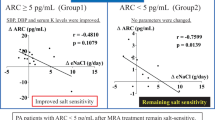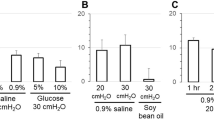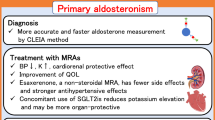Abstract
IT was first noticed by Harrison and Darrow1 that in adrenal insufficiency in dogs the renal tubular function of preserving sodium and excreting potassium was disturbed. This was afterwards interpreted generally as the result of insufficiency of the sodium-potassium exchange mechanism, which was advocated by Berliner et al.2 originally for the explanation of the high output of potassium under a special condition of extremely high potassium load. That the abnormality of excretion of potassium in adrenal insufficiency, except in the final stage, was not dependent upon changes in the glomerular filtration rate has been stressed by Harrison and Darrow1. However, their experiments were done under special conditions by giving potassium chloride (10 g) to the intact dog or the adrenalectomized dog treated with cortical extract in order to compare their concentration ratio (urine/plasma ratio) of potassium with that of the untreated adrenalectomized dog at the same high serum potassium-level found in the latter. The ratio obtained in the former reached 40–75, whereas that found in the latter was about 10. In our experiences the former values seem to be abnormally high, perhaps due to adaptation to potassium load2 to which no attention was paid, while the latter lies rather in the normal range. On the other hand, Harrop et al.3 and recently Fukuda and Koyama4 have noticed that the rise of concentration of potassium in the plasma in adrenal insufficiency paralleled that of urea or non-protein nitrogen and suggested the possibility that the disturbance in excretion of potassium might be the result of reduced glomerular nitration rate. Therefore, experiments were performed to find out whether the clearance of potassium shows direct relation to the glomerular filtration rate in adrenal insufficiency in dogs. The results were compared with those obtained from intact dogs and adrenalectomized dogs maintained with cortisone (1 mg/kg per day) when the glomerular filtration rate was changed by altering the intake of sodium chloride (0–2.0 g/kg per day).
This is a preview of subscription content, access via your institution
Access options
Subscribe to this journal
Receive 51 print issues and online access
$199.00 per year
only $3.90 per issue
Buy this article
- Purchase on Springer Link
- Instant access to full article PDF
Prices may be subject to local taxes which are calculated during checkout
Similar content being viewed by others
References
Harrison, H. E., and Darrow, D. C.., Amer. J. Physiol., 125, 631 (1939).
Berliner, R. W., Kennedy, T. J., and Hilton, J. G., Amer. J. Physiol., 162, 348 (1950).
Harrop, G. A., Soffer, L. J., Nicholson, W. M., and strauss, M., J. Exp. Med., 61, 839 (1935).
Fukuda, T., and Koyama, T., Jap. J. Physiol., 12, 176 (1962).
Owen, J. A., Iggo, B., Scandrett, F. J., and Stewart, C. P., Biochem. J., 58, 426 (1954).
Author information
Authors and Affiliations
Rights and permissions
About this article
Cite this article
FUKUDA, T., KOYAMA, T. Potassium Excretion during Adrenal Insufficiency. Nature 196, 998–999 (1962). https://doi.org/10.1038/196998a0
Issue Date:
DOI: https://doi.org/10.1038/196998a0
Comments
By submitting a comment you agree to abide by our Terms and Community Guidelines. If you find something abusive or that does not comply with our terms or guidelines please flag it as inappropriate.



